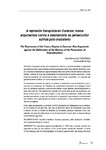Mostrar o rexistro simple do ítem
A represión franquista en Ourense: novos argumentos contra a desmemoria da persecución sufrida polo maxisterio
| dc.contributor.author | Cid Fernández, Xosé Manuel | |
| dc.date.accessioned | 2019-03-06T13:07:45Z | |
| dc.date.available | 2019-03-06T13:07:45Z | |
| dc.date.issued | 2017 | |
| dc.identifier.citation | Cid Fernández, X. (2018). A represión franquista en Ourense. Sarmiento. Revista Galego-Portuguesa De Historia Da Educación, 21, 73-99. https://doi.org/10.17979/srgphe.2017.21.0.4821 | es_ES |
| dc.identifier.issn | 1138-5863 | |
| dc.identifier.uri | http://hdl.handle.net/2183/22111 | |
| dc.description.abstract | [Resumo] A represión sufrida polo maxisterio en 1936 foi un proceso meditado e organizado para derrubar todo o que lembrase á escola republicana, tanto o seu soporte ideolóxico, como as innovacións metodolóxicas experimentadas nese curto período de renovación e democratización. Ourense foi unha das prazas fortes na consolidación da escola republicana –cunha poderosa asociación con conciencia de clase e unha revista vangardista–, e a resposta dos golpistas pódese cualificar de cruel e desproporcionada. Os amañados consellos de guerra, os paseos, a destitución e/ou inhabilitación para o exercicio da ensinanza, os traslados, as suspensións temporais de emprego e soldo foron as principais sancións a que se enfrontaban, e que padeceu aproximadamente un terzo dos máis de 1700 mestres da provincia. Os outros dous terzos non se libraron dun férreo control sobre a súa vida privada e o seu exercicio profesional. Moitos dos mais perseguidos evitaron o paso de “destituídos” a “paseados” aproveitando a solidariedade dos veciños, das organizacións de axuda a republicanos e das poboacións fronteirizas da raia portuguesa. Entre todas as acusacións, a pertenza á ATEO (Asociación de Trabajadores de la Enseñanza de Orense) era de alto risco, polo que os dirixentes tiraron de imaxinación para pórse a cuberto. De feito, o número de dirixentes da Asociación paseados redúcese a tres, que, ademais, non eran dos mais activos no seu funcionamento. A maior parte conseguiu exiliarse ou permanecer agochada | es_ES |
| dc.description.abstract | [Abstract] The repression against schoolteachers in 1936 was a process planned and organised to wipe out any memory of the school system during the Republic, in terms of both ideology and the methodological innovations experimented with during this short period of renewal and democratisation. Ourense was one of the most important areas in the consolidation of Republican schools –closely linked to class consciousness and an avant-garde journal–, and the response of the pro-Franco regime could be described as cruel and disproportionate. The rigged court martial proceedings, the “paseos” or political revenge killings, dismissal and/or disqualification for exercising the teaching profession, transfers, temporary suspension of employment and salary were the main sanctions that could be imposed and one-third of the roughly 1700 schoolteachers in the province were penalized. The other two-thirds were not spared from tight control of their private lives and of the exercise of their profession. Many of the teachers who suffered the most severe persecution were able to avoid passing from dismissal to being victims of revenge murder thanks to the solidarity of the local residents, the organizations formed to help Republicans and the communities located on the Portuguese border. Of all the accusations, the one that entailed the greatest risk was being a member of ATEO (The Association of Education Workers of Ourense); so the leaders of this organization had to use their wits to take cover. As a matter of fact, the number of Association leaders who were murdered came to a total of three people, who were not the most actively involved in its operation. Most of them managed to go into exile or remain in hiding | es_ES |
| dc.language.iso | glg | es_ES |
| dc.relation.uri | https://doi.org/10.17979/srgphe.2017.21.0.4821 | |
| dc.rights | Atribución-CompartirIgual 4.0 España | |
| dc.rights.uri | http://creativecommons.org/licenses/by-sa/4.0/ | |
| dc.subject | Represión maxisterio | es_ES |
| dc.subject | Ourense | es_ES |
| dc.subject | Paseados | es_ES |
| dc.subject | Exilio | es_ES |
| dc.subject | Destitución | es_ES |
| dc.subject | Inhabilitación | es_ES |
| dc.subject | Suspensión temporal | es_ES |
| dc.subject | Traslado | es_ES |
| dc.subject | Repression of schoolteachers | es_ES |
| dc.subject | Revenge murders | es_ES |
| dc.subject | Exile | es_ES |
| dc.subject | Dismissal | es_ES |
| dc.subject | Disqualification | es_ES |
| dc.subject | Temporary suspension | es_ES |
| dc.subject | Transfer | es_ES |
| dc.title | A represión franquista en Ourense: novos argumentos contra a desmemoria da persecución sufrida polo maxisterio | es_ES |
| dc.title.alternative | The repression of the Franco regime in Ourense: new arguments against the obliteration of the memory of the persecution of schoolteachers | es_ES |
| dc.type | info:eu-repo/semantics/article | es_ES |
| dc.rights.access | info:eu-repo/semantics/openAccess | es_ES |
| UDC.journalTitle | Sarmiento: Anuario galego de historia da educación | es_ES |
| UDC.volume | 21 | es_ES |
| UDC.startPage | 73 | es_ES |
| UDC.endPage | 99 | es_ES |






